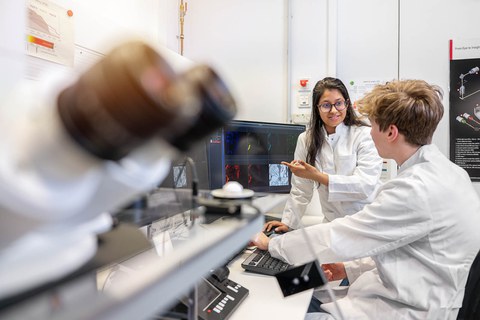Inhaltsverzeichnis
Studienvoraussetzungen
Benötigt werden:
• ein Hochschulabschluss in Biologie oder Medizin oder vergleichbarer Abschluss,
• englische Sprachkenntnisse auf fortgeschrittenem Niveau B2 des Gemeinsamen Europäischen Referenzrahmens für Sprachen
• fundierte Kenntnisse wesentlicher biologischer Prinzipien sowie Grundlagenwissen in der Molekular- und Zellbiologie. Die Feststellung erfolgt ggf. durch ein Eignungsgespräch.
Informationen auf der Seite des Studiengangs
Eignungsfeststellungsverfahren
In diesem Studiengang ist die Teilnahme an einem Eignungsfeststellungs- bzw. Auswahlverfahren Voraussetzung für die Immatrikulation. Beachten Sie, dass die Frist zur Antragstellung ggf. vor den Bewerbungsfristen zum Studium liegen kann (s.o. unter Bewerbungsfristen). Über folgende Links erhalten Sie Hinweise zu allen innerhalb der angegebenen Frist einzureichenden Unterlagen sowie zur entsprechenden Ordnung.
- Hinweise und einzureichende Unterlagen
- Die Bewerbung zum Eignungsfeststellungsverfahren muss direkt beim CMCB erfolgen. Beachten Sie dazu die entsprechenden Hinweise auf der Seite des Studiengangs
Hinweise zur Bewerbung
Liegt zum Zeitpunkt der Antragstellung der Nachweis des ersten berufsqualifizierenden Hochschulabschlusses noch nicht vor, wird die Bewerbung auch dann berücksichtigt, wenn bereits 80 % der durch den Hochschulabschluss erreichbaren Leistungspunkte durch Bescheinigung der Herkunftshochschule (Prüfungsamt) nachgewiesen werden. Das entsprechende Formular finden Sie auf den Seiten des Immatrikulationsamtes.
Allgemeines zum Studiengang

Nutzen Sie die hochmoderne Ausstattung, die in der CMCB Technology Platform verfügbar ist.
Regenerative Biology and Medicine ist ein internationaler Masterstudiengang, der seit über einem Jahrzehnt akademisch und industriell einsatzbereite Absolventen hervorgebracht hat.
Schließen Sie sich uns an und entdecken Sie, wie Stammzellen, Molekularbiologie und Gewebeingenieurwesen zusammenkommen, um die regenerative Medizin der Zukunft zu formen. Tauchen Sie ein in eines der am schnellsten wachsenden Gebiete an der Schnittstelle von Wissenschaft und klinischer Praxis.
Studieninhalt
Erleben Sie eine einzigartige Reise mit dem Programm für Regenerative Biology and Medicine. Über vier Semester hinweg werden Sie theoretisches Wissen mit praktischer, hands-on Erfahrung im Labor vereinen.
Lesen Sie eine detaillierte Beschreibung des Lehrplans hier.
Nachdem Sie im ersten Semester die Grundlagen der regenerativen Biologie gelernt haben, werden Sie im zweiten Semester zu einer der drei Schwerpunktbereiche wechseln:
— Regenerative Zellbiologie - bietet eingehende Kenntnisse über die zentralen molekularen und zellulären Mechanismen der Entwicklung und Regeneration von Geweben und Organen der wichtigsten Modellorganismen sowie der damit verbundenen aktuellen experimentellen Analysemethoden.
— Regenerative Neurowissenschaften - umfasst eingehende Kenntnisse der zellulären, molekularen, systemischen und regenerativen Neurowissenschaften sowie der damit verbundenen aktuellen experimentellen Analysemethoden sowie der klinischen Konzepte von Krankheiten, für die neuroregenerative Therapien existieren oder in Entwicklung sind.
— Regenerative Medizin - bietet eingehende Kenntnisse über die Pathologie von Krankheiten und die betroffenen Organsysteme sowie die damit verbundenen klinischen Konzepte der regenerativen Medizin, einschließlich des Übersetzungsprozesses von der Grundlagenforschung zur Anwendung.
Abgesehen von zahlreichen praktischen Übungen im Verlauf des Studiums umfassen das zweite und dritte Semester zwei umfangreiche Lab Rotations. Sie werden Seite an Seite mit führenden Expert:innen am Zentrum für Regenerative Therapien Dresden (CRTD), seinen kooperierenden Instituten und Kliniken arbeiten, um sich auf Ihre individuellen Laborprojekte zu konzentrieren.
Das gesamte vierte Semester ist der Masterarbeit gewidmet. Sie können aus einer Vielzahl von Forschungsthemen wählen und in der ausgezeichneten Forschungsumgebung des Zentrum für Regenerative Therapien Dresden (CRTD) arbeiten oder sich an Forschungsgruppen in anderen Abteilungen der TU Dresden, der Klinik oder Partnerinstituten wenden.
Auslandsaufenthalt
Lust auf ein Semester im Ausland? Auslandssemester, -praktika oder Sprachkurse – als Student:in profitieren Sie auf jeden Fall von einem Auslandsaufenthalt. Sie können Ihre Fach- und Sprachkenntnisse verbessern, Kontakte knüpfen, Freunde gewinnen, andere Kulturen kennenlernen und vieles mehr. Mehr Informationen gibt es auf den Seiten des International Office.
Berufsfelder
Unsere Alumni zeichnen sich sowohl in der akademischen Welt als auch in der Industrie aus, von lokalen Start-ups bis hin zu globalen Pharmaunternehmen.
Die starke Betonung des Programms auf praxis- und forschungsorientierten Projekten stellt sicher, dass unsere Absolvent:innen in der Lage sind, vielfältige und komplexe Aufgaben in Forschung und Entwicklung zu bewältigen, die verschiedene Bereiche wie Zellbiologie, Entwicklungsbiologie, Stammzellbiologie und andere umfassen.
Das Masterstudiengang Regenerative Biology and Medicine bereitet den Weg für eine akademische Karriere vor. Sollten Sie sich dafür entscheiden, in Dresden zu bleiben, bietet das PhD Early Admission die Möglichkeit eines früheren Einstiegs innerhalb des Dresden International PhD Program (DIPP).
Studiendokumente
Die Amtlichen Bekanntmachungen der TU Dresden beinhalten alle veröffentlichten Ordnungen. Benutzen Sie die Suchmöglichkeiten, um die gewünschten Dokumente zu finden: Amtliche Bekanntmachungen
Zusätzlich sind die Ordnungen auf den Webseiten der zuständigen Einrichtung auffindbar.
- Studienordnung
- Prüfungsordnung
- Eignungsfeststellungsordnung
… finden Sie auf der entsprechenden Seite der zuständigen Einrichtung.
Kontakte
Immatrikulationsamt
ServiceCenterStudium
Postanschrift:
Technische Universität Dresden
Immatrikulationsamt
01062 Dresden
- Tel.
- +49 351 463-42000
Sprechzeiten:
Center for Molecular and Cellular Bioengineering (CMCB)
Fachberater
Herr Prof. Marius Ader
Center for Molecular and Cellular Bioengineering (CMCB)
Besuchsadresse:
Center for Regenerative Therapies Dresden, Fetscherstr. 105, 01307 Dresden
Postanschrift:
TU Dresden
Center for Molecular and Cellular Bioengineering (CMCB)
Center for Regenerative Therapies Dresden (CRTD)
Fetscherstraße 105
01307 Dresden
- Tel.
- +49 351 458-82063
Sprechzeiten:
Bitte Termin vereinbaren bzw. Sprechzeiten beachten.
International Office
International Office
Besuchsadresse:
Fritz-Foerster-Bau (FOE), Mommsenstr. 6, Ostflügel/1. Etage, Raum 178
Postanschrift:
TU Dresden
Internationale Office
01062 Dresden
- Tel.
- +49 351 463-42000
Sprechzeiten:
- Dienstag:
- 13:30 - 15:30
- Donnerstag:
- 13:30 - 15:30
Terminvereinbarung für die Sprechzeiten bitte über den SCS Servicepoint im Foyer!
